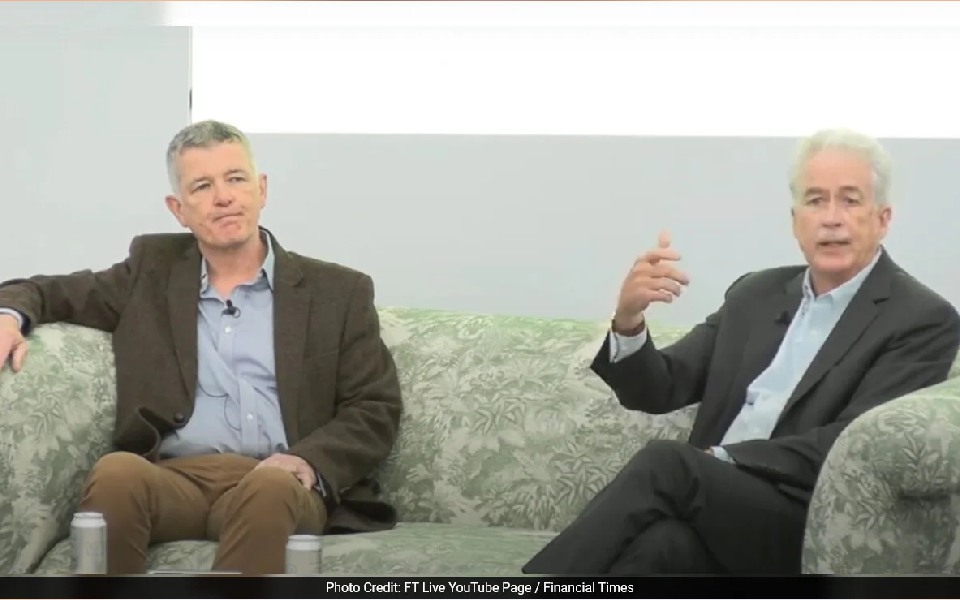London, Sep 7: The heads of the British and American foreign intelligence agencies said on Saturday that Ukraine's surprise incursion into Russia is a significant achievement that could change the narrative of the grinding 2-1/2-year war, as they urged Kyiv's allies not to be held back by Russian threats of escalation.
Richard Moore, the head of MI6, said Kyiv's surprise August offensive to seize territory in Russia's Kursk region was “typically audacious and bold on the part of the Ukrainians, to try and change the game”.
He said the offensive — which Ukraine said has captured about 1,300 square kilometers (500 square miles) of Russian territory — had “brought the war home to ordinary Russians”.
Speaking alongside Moore at an unprecedented joint public event in London, CIA Director William Burns said the offensive was a “significant achievement” that had exposed vulnerabilities in the Russian military.
It has yet to be seen whether Ukraine can turn its tactical achievement into a long-term advantage. So far the offensive has not drawn Russian President Vladimir Putin's focus away from eastern Ukraine, where his forces are closing in on the strategically situated city of Pokrovsk.
Ukrainian President Volodymyr Zelenskyy has repeatedly pressed allies to let Kyiv use Western-supplied missiles to strike deep inside Russia and hit sites from which Moscow launches aerial attacks.
While some countries, including Britain, are thought to tacitly support the idea, others including Germany and the US are reluctant.
US President Joe Biden has allowed Ukraine to fire US-provided missiles into Russia in self-defence, but the distance has been largely limited to cross-border targets deemed a direct threat, out of concerns about further escalating the conflict.
Burns said the West should be “mindful” of the escalation risk but not be “unnecessarily intimidated” by Russian saber-rattling.
Burns also warned of the growing and “troubling” defence relationship between Russia, China, Iran and North Korea that he said threatens both Ukraine and Western allies in the Middle East. North Korea has sent ammunition and missiles to Russia to use against Ukraine, while Iran supplies Moscow with attack drones.
Burns said the CIA had yet to see evidence of China sending weapons to Russia, “but we see lot of things short of that”. And he warned Iran against supplying ballistic missiles to Moscow, saying “it would be a dramatic escalation” of the relationship.
Ahead of their joint appearance at the FT Weekend Festival at London's Kenwood House, the two spymasters wrote an opinion piece for the Financial Times, calling for a cease-fire in Gaza and saying their agencies had “exploited our intelligence channels to push hard for restraint and de-escalation”.
They said a cease-fire in Israel's war against Hamas “could end the suffering and appalling loss of life of Palestinian civilians and bring home the hostages after 11 months of hellish confinement”.
Burns has been heavily involved in efforts to broker an end to the fighting, travelling to Egypt in August for high-level talks aimed at bringing about a hostage deal and at least a temporary halt to the conflict.
So far there has been no agreement, though United States officials insist a deal is close. Biden said recently that “just a couple more issues” remain unresolved. Israeli Prime Minister Benjamin Netanyahu, however, has said reports of a breakthrough are “exactly inaccurate”.
“I cannot tell you how close we are right now,” Burns told the London audience. He said negotiators are working on new, detailed proposals that would be presented within several days.
Burns said that while 90 per cent of the text has been agreed between the warring sides, “the last 10 per cent is the last 10 per cent for a reason, because it's the hardest part to do”.
Burns said ending the conflict would require “some hard choices and some political compromises” from both Israel and Hamas.
The US and the United Kingdom are both staunch allies of Israel, though London diverged from Washington on Monday by suspending some arms exports to Israel because of the risk they could be used to break international law.
In their article, Burns and Moore stressed the strength of the trans-Atlantic relationship in the face of “an unprecedented array of threats”, including an assertive Russia, an ever-more powerful China and the constant drumbeat of international terrorism — all complicated by rapid technological change.
They highlighted Russia's “reckless campaign of sabotage” across Europe and the “cynical use of technology to spread lies and disinformation designed to drive wedges between us”.
US officials have long accused Moscow of meddling in American elections, and this week the Biden administration seized Kremlin-run websites and charged employees of Russian broadcaster RT with covertly funding social media campaigns to pump out pro-Kremlin messages and sow discord around November's presidential contest.
Russia has also been linked by Western officials to several planned attacks in Europe, including an alleged plot to burn down Ukrainian-owned businesses in London.
Moore said Russia's spies were acting in an increasingly desperate and reckless way.
"Russian intelligence has gone a bit feral," he said.
Let the Truth be known. If you read VB and like VB, please be a VB Supporter and Help us deliver the Truth to one and all.
Johannesburg (AP): A 32-year-old suspect has been arrested in connection with a mass shooting which claimed the lives of 12 people including three children at an unlicensed pub earlier this month, South African police said on Monday.
The man is suspected of being one of the three people who opened fire on patrons in a pub at Saulsville township, west of South Africa's capital Pretoria, killing 12 people including three children aged 3, 12 and 16.
At least 13 people were also injured during the attack, whose motive remains unknown.
According to the police, the suspect was arrested on Sunday while traveling to Botlokwa in Limpopo province, more than 340 km from where the mass shooting took place on Dec 6.
An unlicensed firearm believed to have been used during the attack was recovered from the suspect's vehicle.
“The 32-year-old suspect was intercepted by Limpopo Tracking Team on the R101 Road in Westenburg precinct. During the arrest, the team recovered an unlicensed firearm, a hand gun, believed to have been used in the commission of the multiple murders. The firearm will be taken to the Forensic Science Laboratory for ballistic analysis,” police said in statement.
The suspect was arrested on the same day that another mass shooting at a pub took place in the Bekkersdal township, west of Johannesburg, in which nine people were killed and 10 wounded when unknown gunmen opened fire on patrons.
Police have since launched a search for the suspects.
South Africa has one of the highest homicide rates in the world and recorded more than 26,000 homicides in 2024 — an average of more than 70 a day. Firearms are by far the leading cause of death in homicides.
The country of 62 million people has relatively strict gun ownership laws, but many killings are committed with illegal guns, according to authorities.
According to police, mass shootings at unlicensed bars are becoming a serious problem. Police shut down more than 11,000 illegal taverns between April and September this year and arrested more than 18,000 people for involvement in illegal liquor sales.





